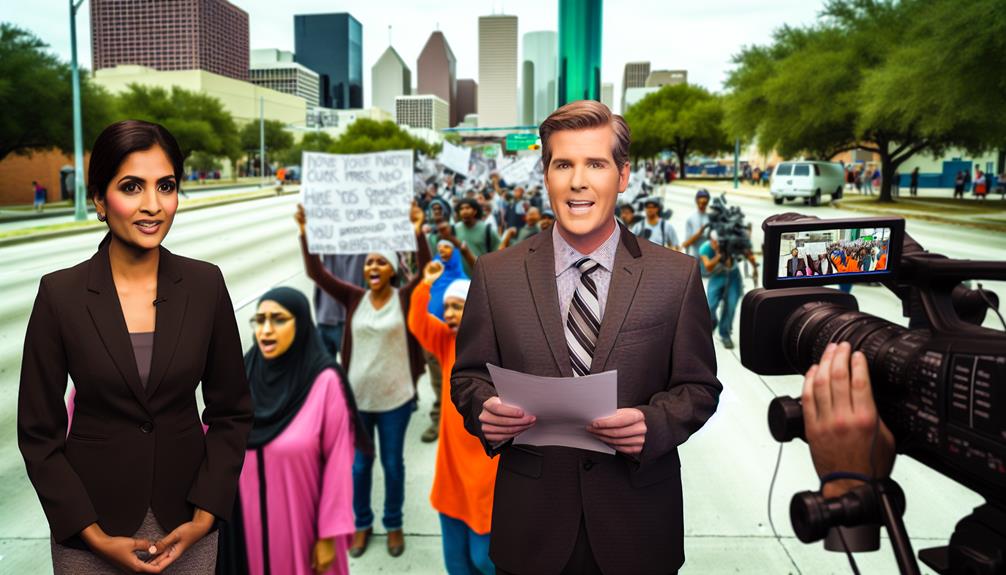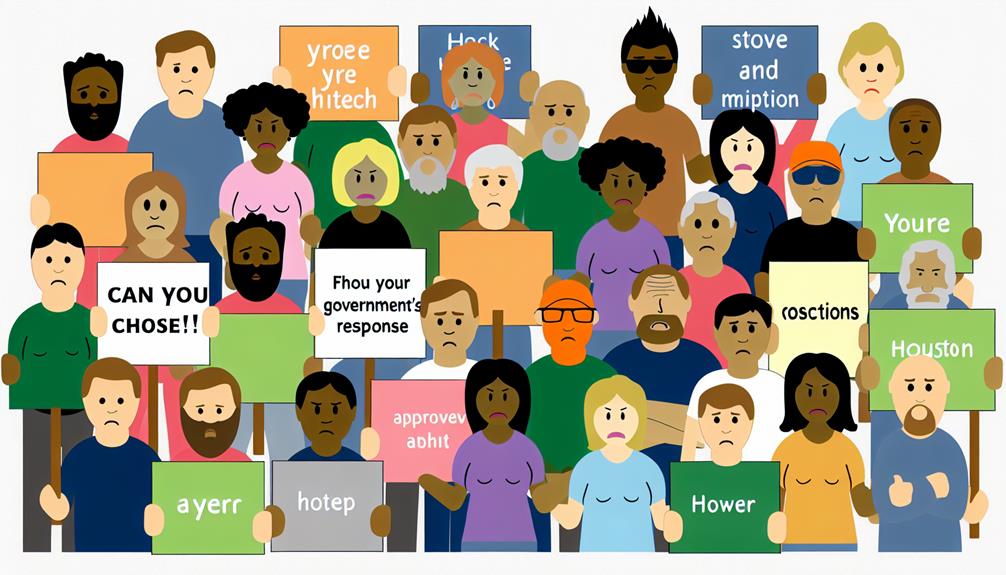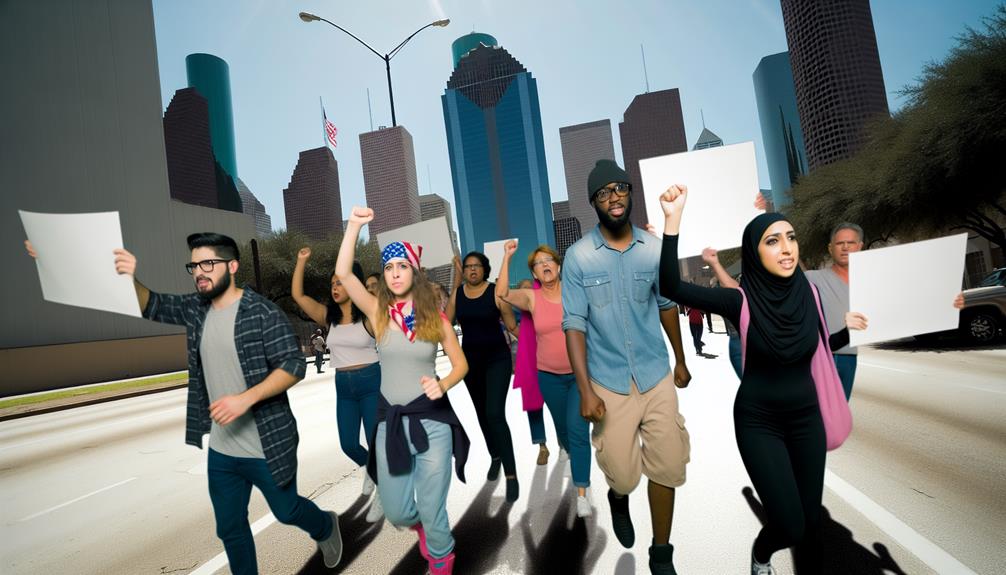Did you know that a whopping 78% of young Houstonians are actively backing political protests to shake things up and drive social and political change?
This eye-opening stat points to a clear trend in the city's population, showing a strong link between activism and generational viewpoints.
Delve into the top five insights on political protests in Houston to uncover what's fueling this fervent support and how it's shaping the community.
Houstonians' Perception of Protest Effectiveness
In Houston, protests are seen as powerful drivers of social change, with 62% of residents recognizing their impact. These demonstrations spark greater awareness, lead to policy changes, and encourage community involvement.
The younger generation, making up 78% of supporters, firmly believes in the effectiveness of protests in shaping political decisions. For Houstonians, protests play a crucial role in expressing dissent, advocating for justice, and pushing for societal advancement.
The community views these gatherings as essential for addressing pressing issues and influencing public conversations. Data reveals that protests in Houston have brought about concrete results, such as policy adjustments, shifts in practices, and more open dialogues.
Embracing protests as a tool for progress, Houston residents actively engage in these movements to drive change and push for a fairer and more inclusive society.
Factors Influencing Protest Participation
When it comes to joining protests, there are several factors that can influence whether someone decides to participate or not. Things like your background, education, personal beliefs, social circle, and past experiences all play a role in shaping this decision.
For many folks, their socioeconomic status can be a hurdle, especially if they're struggling financially. Costs like getting to the protest location and taking time off from work can make it difficult for lower-income individuals to join in. Research shows that those with higher levels of education are more likely to get involved in political demonstrations. This suggests that education plays a big part in shaping people's willingness to protest.
Personal beliefs and values also come into play. People are more inclined to join protests that resonate with their own ideologies. If your friends or family members are involved in a demonstration, you might be more likely to join them. Past protest experience can also have a big impact on future participation. If you've been part of protests before, you're more likely to join in again.
All these factors work together to influence whether someone decides to take part in a protest. It's a complex mix of personal circumstances, beliefs, and connections that ultimately shape our decisions to stand up and be counted.
Media Coverage Impact on Protest Awareness

When it comes to how protests are covered in the media, especially in Houston, it's clear that mainstream media holds a lot of sway in shaping public opinion. The way these protests are portrayed can make a big difference in how they're perceived by the community.
Journalism biases can also come into play, sometimes leading to protests being downplayed or marginalized in news coverage. It's important to recognize these biases and seek out a variety of sources to get a more complete picture of what's happening.
With the rise of digital technology, protests now have new ways to get their message out there beyond traditional media. Social media platforms and online channels can amplify voices and reach a wider audience, changing the game for protest coverage.
How the media chooses to frame and source their stories also plays a crucial role in shaping public opinion. These decisions can influence how protests are portrayed and understood by the public, highlighting the power of media in shaping narratives.
In the end, understanding the impact of media coverage on protests is key to grasping the full scope of social movements and activism, especially in a dynamic city like Houston. It's all about staying informed, questioning sources, and looking beyond the headlines to truly understand the stories behind the protests.
Support for Diverse Protest Causes
In Houston, a vibrant tapestry of protest movements rallies together, showcasing a powerful front for social justice and equality. From the voices of Black Lives Matter to the activism of Democratic Socialists of America and Redneck Revolt, a diverse range of groups converge in demonstrations throughout the city.
Individuals from various racial and political backgrounds unite in solidarity to champion critical causes like racial equity, social parity, and political transformation in Houston. Advocacy for LGBTQ rights, women's rights, and environmental justice also takes center stage, with a network of resources and support networks driving progress in these areas.
The protests in Houston embody a mosaic of viewpoints and motivations, where people from different faiths and cultures join forces to uphold a spectrum of social justice issues. Protesters stand up for marginalized communities, civil liberties, environmental preservation, and a host of other societal concerns, underscoring a resolute dedication to instigating positive change in the urban landscape.
Attitudes Towards Government Response to Protests

In the midst of the various responses to protests in Houston, there's a clear range of attitudes towards how the government is handling the demonstrations, showcasing a mix of societal values and viewpoints.
- Diverse Reactions: People in Houston have different reactions to the government's response to the protests, with some backing the measures taken while others criticize the arrests and use of force against demonstrators.
- Leaders' Positions: Government officials in Houston have taken different stances towards the protests, with some showing empathy and support for the causes being championed, while others have opted for a more forceful approach.
- Rights Debate: The government's reaction to the protests has sparked debates around free speech, civil liberties, and finding a balance between public safety and respecting constitutional rights.
- Public Views: Public opinion on how the government is handling the protests in Houston is split, with some seeing it as necessary for maintaining order and safety, while others view it as a violation of their constitutional rights.
Frequently Asked Questions
Why Is Houston so Spread Out?
Houston's unique layout stems from its absence of zoning regulations, allowing for unrestricted urban growth. This decentralized development has led to longer commute times and a reliance on cars for transportation. The city's diverse geography has paved the way for a wide range of land use patterns to emerge.
Is Houston Still the 3rd Largest City?
As of 2021, Houston doesn't hold the title of the 3rd largest city. With a population exceeding 2.3 million, it claims the spot as the 4th largest city in the United States. Houston's mix of people, thriving economy, and lively culture truly set it apart.
Is Houston Considered the South?
Absolutely, Houston is definitely considered part of the South. With its deep-rooted connections to the Confederacy and rich Southern heritage, not to mention its prime spot in Texas, Houston is undeniably a Southern city in the United States.
What Is Houston Most Well Known For?
Houston is a vibrant city known for its size, diversity, thriving energy sector, renowned medical facilities, and significant contributions to space exploration. It's a place that embraces a mix of cultures, fosters innovation, and teems with opportunities, making it a distinctive urban hub.
